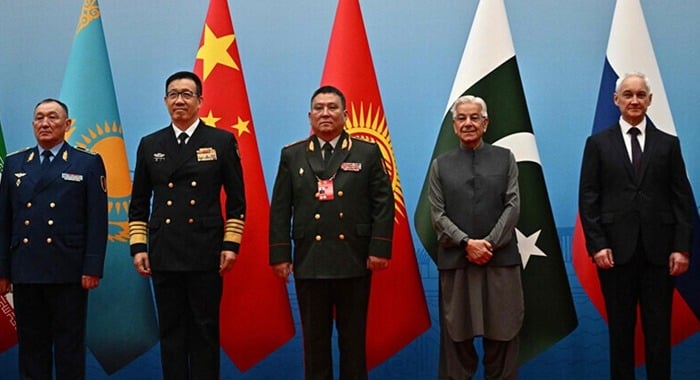In a significant diplomatic breakthrough, Pakistan succeeded in blocking India’s attempts to politicize the Shanghai Cooperation Organisation (SCO) Defence Ministers’ Summit, as New Delhi failed to insert language linking the recent Pahalgam attack to Pakistan in the joint communiqué. Instead, the SCO members unanimously condemned terrorism in Balochistan, marking a notable victory for Pakistan and a diplomatic embarrassment for India, whose delegation refused to sign the final statement.
According to Dawn News, the Indian delegation lobbied intensely to frame Pakistan in the communiqué but was firmly rebuffed by other member states. Despite repeated efforts and backdoor appeals, India found no support for its position. In visible frustration, the Indian representatives declined to endorse the final document, highlighting their isolation within the multilateral forum.
The SCO’s joint communiqué instead reflected a clear regional consensus, specifically denouncing terrorist incidents in Pakistan’s Balochistan province an area that has suffered repeated attacks allegedly backed by external forces. This rare inclusion underscores growing recognition among SCO members of Pakistan’s legitimate security concerns and the need for coordinated efforts against cross-border terrorism.
The high-level summit was convened in China’s eastern port city of Qingdao and attended by defence ministers from Iran, Russia, Pakistan, Belarus, and other SCO states. Coming amid escalating global tensions from the fragile ceasefire in the Middle East to increasing NATO military budgets in Europe—the meeting reflected the bloc’s emphasis on regional stability through multilateral cooperation.
Chinese Defence Minister Dong Jun, while welcoming participants, described the summit as an effort to restore balance in an increasingly unstable global landscape. “Major changes of the century are accelerating. Unilateralism and protectionism are rising. Hegemonic and coercive behaviour is seriously damaging the international order,” he said, calling on SCO members to take stronger collective action to safeguard peaceful development.
Indian Defence Minister Rajnath Singh, who attended the meeting, spoke of the need for regional cooperation but failed to convince counterparts to endorse India’s anti-Pakistan narrative. His delegation’s refusal to sign the final statement further highlighted New Delhi’s diminishing influence in regional security dialogues.
In bilateral talks on the sidelines, Russian Defence Minister Andrey Belousov praised China-Russia relations as “historically unparalleled,” underscoring deeper strategic alignment within the SCO. “Our friendly ties are progressing across all domains,” he remarked.
While Beijing has maintained a public posture of neutrality on the Russia-Ukraine conflict, Western nations assert that China’s economic and diplomatic backing has indirectly strengthened Moscow’s military campaign.
The SCO’s decision to reject India’s politicization and instead spotlight terrorism in Balochistan reflects a pivotal shift in regional diplomacy. For Pakistan, the outcome affirms its position as a frontline state confronting externally fueled terrorism. For India, the summit served as a sobering reminder of the limitations of unilateral narratives in an increasingly multipolar world.





